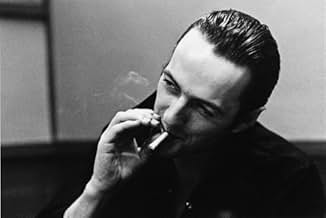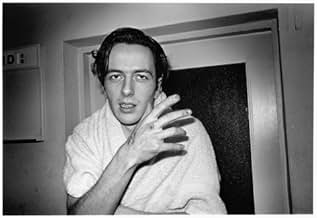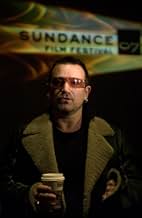IMDb RATING
7.5/10
4.4K
YOUR RATING
As the front man of the Clash from 1977, Joe Strummer changed people's lives forever. Four years after his death, his influence reaches out around the world, more strongly now than ever befo... Read allAs the front man of the Clash from 1977, Joe Strummer changed people's lives forever. Four years after his death, his influence reaches out around the world, more strongly now than ever before.As the front man of the Clash from 1977, Joe Strummer changed people's lives forever. Four years after his death, his influence reaches out around the world, more strongly now than ever before.
- Awards
- 1 win & 4 nominations total
Joe Strummer
- Self
- (archive footage)
The 101ers
- Themselves
- (archive footage)
Brigitte Bardot
- Self
- (archive footage)
Mark 'Bez' Berry
- Self
- (as Bez)
Big Audio Dynamite
- Themselves
- (archive footage)
The Clash
- Themselves
- (archive footage)
Peter Cushing
- Winston Smith
- (archive footage)
Featured reviews
A documentary charting the life and untimely death of one of the leading figures in the Punk movement in Great Britain in the late 70s. From pub rock beginnings to filling out stadiums in North America, this film attempts to create an in-depth marker to just what made the Clash front man tick.
First off let me say that I myself consider myself to be one of The Clash, and Strummer's biggest fans. Being around at the time of the Punk explosion, I still to this day, live my life as a Punk in spirit. For sure this is an invaluable film for fans and anybody who's interested in getting involved with Joe and his music, with some of the early footage (to me at least) being quite simply priceless. Yet it's lacking the necessary edge to make it one of music's great documentaries.
Julien Temple (who set the benchmark for rock docs with his brilliant The Filth And The Fury in 2000) tells it well, edits it nicely and gets the tight and trusted friends and colleagues to line up with back slapping praise. You got the likes of Bono, Martin Scorsese, Johnny Depp, Flea, John Cussack and Michael Stipe, all men of substance who certainly don't need to be on this film to make themselves seem cool-so you can rest assured that these guys mean it when they are dishing out the plaudits to one of Punks great fathers. But, and here's the thing with me, the itch that I just can't scratch, why has important periods in The Clash/Strummer's life been given over to so many filled in back slaps? Anyone who knows their Clash history will know of the troubled making of their second album, Give Em Enough Rope, it's not even mentioned here! From The Clash's debut album we lurch forward to London Calling, it's a gap of some distinction I can tell you, and practically unforgivable. I was further annoyed that the new look Clash around the time of Cut The Crap was given about a two minute overview, this was a very critical time in Joe's life, but we basically just get told that, oh Joe was unhappy and the new guys were in awe of him.
This is far from definitive, but as it is, it's probably the only documentary we will ever have on the late great Joe Strummer. So with that in mind I'm truly thankful. But as glad as I am that it exists, I'm equally annoyed that the story has holes that have not been filled because Mr Temple (perhaps wondering just how many people would want to see the picture) has over crammed in the plaudits. 7/10
First off let me say that I myself consider myself to be one of The Clash, and Strummer's biggest fans. Being around at the time of the Punk explosion, I still to this day, live my life as a Punk in spirit. For sure this is an invaluable film for fans and anybody who's interested in getting involved with Joe and his music, with some of the early footage (to me at least) being quite simply priceless. Yet it's lacking the necessary edge to make it one of music's great documentaries.
Julien Temple (who set the benchmark for rock docs with his brilliant The Filth And The Fury in 2000) tells it well, edits it nicely and gets the tight and trusted friends and colleagues to line up with back slapping praise. You got the likes of Bono, Martin Scorsese, Johnny Depp, Flea, John Cussack and Michael Stipe, all men of substance who certainly don't need to be on this film to make themselves seem cool-so you can rest assured that these guys mean it when they are dishing out the plaudits to one of Punks great fathers. But, and here's the thing with me, the itch that I just can't scratch, why has important periods in The Clash/Strummer's life been given over to so many filled in back slaps? Anyone who knows their Clash history will know of the troubled making of their second album, Give Em Enough Rope, it's not even mentioned here! From The Clash's debut album we lurch forward to London Calling, it's a gap of some distinction I can tell you, and practically unforgivable. I was further annoyed that the new look Clash around the time of Cut The Crap was given about a two minute overview, this was a very critical time in Joe's life, but we basically just get told that, oh Joe was unhappy and the new guys were in awe of him.
This is far from definitive, but as it is, it's probably the only documentary we will ever have on the late great Joe Strummer. So with that in mind I'm truly thankful. But as glad as I am that it exists, I'm equally annoyed that the story has holes that have not been filled because Mr Temple (perhaps wondering just how many people would want to see the picture) has over crammed in the plaudits. 7/10
Julian Temple -- who filmed the Clash at one of their earliest rehearsals -- has assembled a truly impressive array of footage, including 8mm family films from Joe's childhood and a performance from the 101ers, his pre-Clash R&B/pub-rock band. There are interviews with Joe's squat-mates from the early 70s, Mick Jones and Topper Headon of the Clash, and numerous other people (musicians and other) who either worked with Joe or were influenced by him. My only reservation is that the movie might be overwhelming to someone who was unfamiliar with Strummer's work, or the broad outlines of his history, but I think even a complete novice would have to come away impressed by the sheer scope of Joe's legacy, both in terms of music and the influence he left on his friends and admirers.
What a documentary film that made by Julien Temple, Filmmaker Julien chronicles the transformation of a self-described "mouthy little git," born John Mellor, into an anti establishment icon known to the world as Joe Strummer. In his latest documentary, Temple uncovers the myth behind the front man of the seminal punk band the Clash. Through previously unearthed interviews with Strummer himself and recollections of those who knew him best, Temple reveals a complex man who used his music as a bullhorn for his conscience-as well as a means to educate others about the injustices of the world. The film includes live concert footage spanning Strummer's career and tapes of his BBC radio program, all of which provide a fitting soundtrack to his distinctive and storied existence. The performance footage would be fascinating on its own, but Temple probes beyond Strummer's mystique to reveal a person with his own flaws who could sometimes be idealistic to a fault. Temple has created a thoughtful and poignant portrait of a man many think they knew. 'Joe Strummer: The Future Is Unwritten' provides a rare glimpse into the man behind the legend of "punk rock warlord." There are personal interviews with some of the surviving members of The Clash, as well as with people like Bono and John Cusack that are very personal, and serve the film well. They don't stand out as "Look! We've stuck a celebrity in here!" Temple uses a campfire setting for most of these interviews, and given the fact that Strummer used to Organize large campfire celebrations before he died, it's only fitting. One thing for certain is that the Joe Strummer we see at the campfires is a much more approachable and likable figure than the Strummer who avoids confrontations and has other people fire band members during the heyday of The Clash.
The majority of the talking heads that are used to frame this film have been captured outdoors next to a bonfire, brazier or something similar there is a reason for it and it is something that you should bear in mind when considering watching this film. The device is a good one and what it does is take sound-bites that could have just felt a bit like scripted puff and turns them into reminiscing round a fire with friends. This fits with the "bigger" comments from band members etc, who do feel like they are sitting reminiscing about the old days but with this comes a problem. You see, the entire film has embraced this approach the approach that we are among friends, people who were all there, know all the stories and love telling them and hearing them even if they have heard them many times before. Not that there is anything wrong with this as an idea because it does offer the potential for an engagingly personal film that perhaps risks inaccuracy via recollection but gets a lot of passion and such in its place.
Unfortunately when taken to an extreme this does risk alienating the casual viewer who is too young to remember and is using the film to fill in them on what they have missed. With this audience sector (which I am in) Julian Temple seems disinterested, even to the point where he doesn't put any captions on the talking heads to tell us who they are. This is irritating because it is hard to shake the feeling that you are looked down on by Temple and perhaps a bit unwelcome as a viewer and it is not a feeling that I ever shook. However, having said that, the personal reflections and observations do help counter this because they do make for an engaging film in terms of feeling if not information. The majority of the footage is "home" video and newsreel footage from the times in question and this is mostly edited together really well to inform and shore up the contributions and feel.
It is not totally successful though even if it was a big improvement on Temple's film on Glastonbury. It doesn't inform a lot and it is so personal that it is hard to always stay with it whenever you do feel like you are being excluded if you're not in the in-crowd. Ironically though, while he seeks this feel at the expense of names on the contributors, he is fine with having famous faces with almost nothing to say in there OK it at least gave me people I could instantly put a name to but otherwise I'm not sure what Cusack, Bono, Depp and others added that anyone with The Clash greatest hits CD on their shelf. Not sure why he bothered to put footage of no relevance in either (such as Animal Farm clips) as it just cluttered it and made it feel like he was trying to be creative by doing what any arty film student would with montages of stock footage.
The Future is Unwritten is an engaging but flawed film that will mostly appeal to those that "were there, man" rather than the casual viewer. The passion and personal feel to the film at least counters the "if you're name's not down you're not coming in" feel that it all has but never totally and, while Temple does produce an interesting structure and feel, it doesn't work as well as he would like to think. A must for fans and perhaps just about good enough for the casual viewer.
Unfortunately when taken to an extreme this does risk alienating the casual viewer who is too young to remember and is using the film to fill in them on what they have missed. With this audience sector (which I am in) Julian Temple seems disinterested, even to the point where he doesn't put any captions on the talking heads to tell us who they are. This is irritating because it is hard to shake the feeling that you are looked down on by Temple and perhaps a bit unwelcome as a viewer and it is not a feeling that I ever shook. However, having said that, the personal reflections and observations do help counter this because they do make for an engaging film in terms of feeling if not information. The majority of the footage is "home" video and newsreel footage from the times in question and this is mostly edited together really well to inform and shore up the contributions and feel.
It is not totally successful though even if it was a big improvement on Temple's film on Glastonbury. It doesn't inform a lot and it is so personal that it is hard to always stay with it whenever you do feel like you are being excluded if you're not in the in-crowd. Ironically though, while he seeks this feel at the expense of names on the contributors, he is fine with having famous faces with almost nothing to say in there OK it at least gave me people I could instantly put a name to but otherwise I'm not sure what Cusack, Bono, Depp and others added that anyone with The Clash greatest hits CD on their shelf. Not sure why he bothered to put footage of no relevance in either (such as Animal Farm clips) as it just cluttered it and made it feel like he was trying to be creative by doing what any arty film student would with montages of stock footage.
The Future is Unwritten is an engaging but flawed film that will mostly appeal to those that "were there, man" rather than the casual viewer. The passion and personal feel to the film at least counters the "if you're name's not down you're not coming in" feel that it all has but never totally and, while Temple does produce an interesting structure and feel, it doesn't work as well as he would like to think. A must for fans and perhaps just about good enough for the casual viewer.
10vez_kirk
Wow, I was blown away by this film. Despite having been born in 1990, and not having got into punk 'til 1 1/2 years after Joe's death (something I'm constantly kicking myself for), this film made me feel involved in his life + the '70s punk scene, as though I actually lived it. That's the sign of a pretty feckin' good film, if you ask me.
I found the format to be fantastically original (everything from having Joe 'narrate' through his radio show, to the use of his cartoons and the campfire interviews), the content was thorough but not overly concerned with trivial details, and it was just generally a warm, involving + insightful portrayal of Joe's life and the British punk scene.
Fantastic. See it.
I found the format to be fantastically original (everything from having Joe 'narrate' through his radio show, to the use of his cartoons and the campfire interviews), the content was thorough but not overly concerned with trivial details, and it was just generally a warm, involving + insightful portrayal of Joe's life and the British punk scene.
Fantastic. See it.
Did you know
- ConnectionsFeatured in 'Joe Strummer': The Importance of Fire (2007)
- How long is Joe Strummer: The Future Is Unwritten?Powered by Alexa
Details
Box office
- Gross US & Canada
- $248,362
- Opening weekend US & Canada
- $20,880
- Nov 4, 2007
- Gross worldwide
- $1,193,491
- Runtime
- 2h 4m(124 min)
- Color
- Sound mix
Contribute to this page
Suggest an edit or add missing content






































